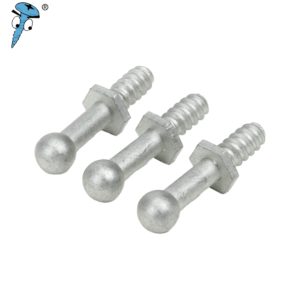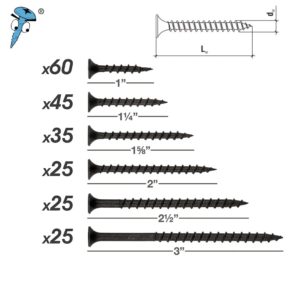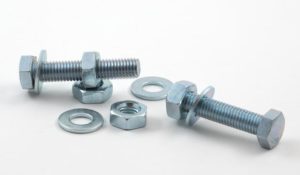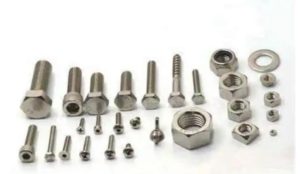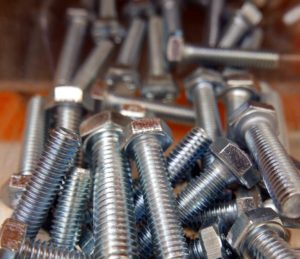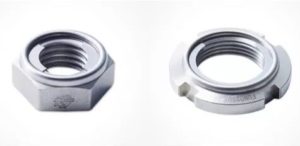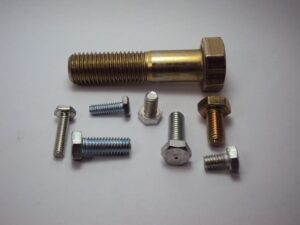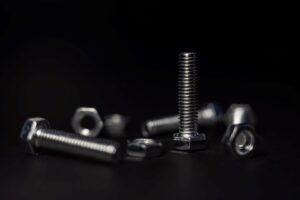What are Nut and Bolt Fasteners?
Fasteners are fundamental devices that share a common function of joining and securing two materials. Bolts are externally threaded fasteners with greater holding strength than common screws. At the same time, nuts are internally threaded to mate with bolts in assembly and provide a greater grip on fastened objects.
What are nuts?
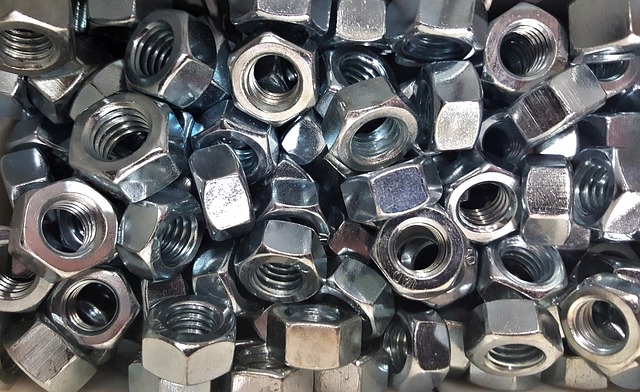
A nut is a non-permanent fastener physically different from other threaded components because of its internal threading in the hole. The primary function of nuts is to mate with bolts to enhance the capacity and tightening of the assembly. And just like the usual industrial fasteners, nuts have a variety of types, sizes, shapes, and thread patterns to match the external threading of bolts or screws.
Types of Nuts
Several terms, such as acorn nut, dome nut, blind nut, domed cap nut, and crown hex nut, are known as Cap Nuts. The nut has a domed end that protects the thread of bolts by preventing external contact.
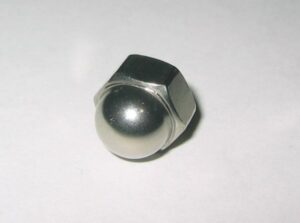
Flange Nuts are also known as collar nuts. This type of nut is usually used in vehicles. The nut has a wide flange in one end that acts as an integrated washer to distribute the pressure on the surface of materials.
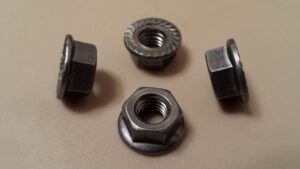
Lock Nuts are a general type of locking nuts that are designed to prevent the loosening of the assembly due to vibrations.
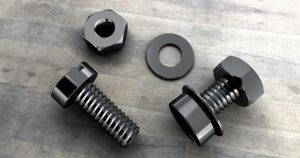
Hex Nuts comprise various sub-types, usually with hex bolts or hex cap screws.
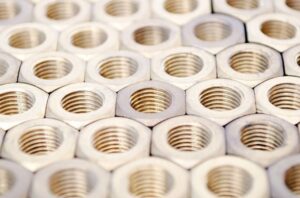
Wing Nuts are also called butterfly nuts, with two large “wings” on each side. They are twisted together to tighten and prevent the loosening of the connected objects.
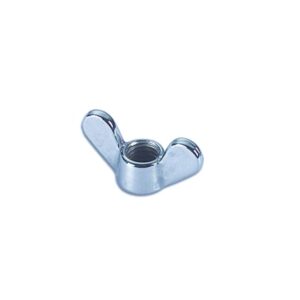
What are bolts?
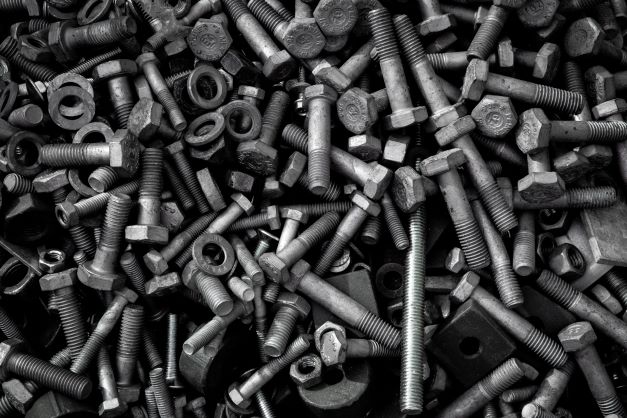
Bolts are a general type of screw with greater capabilities in terms of strength in the hold. They require a connecting device like nuts and washers for installation. They can have fully or partially threaded shafts, various types of heads, and different shapes or sizes.
Types of Bolts
Carriage Bolts have a domed head feature and a square section underneath the bolt. Usually used in wood or masonry applications.
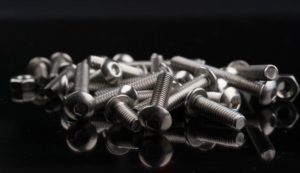
Flange Bolts consist of a flange head that evenly distributes the load on a broader area.
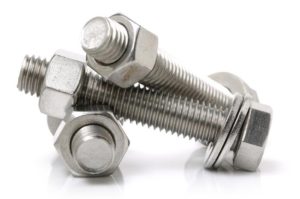
Hex bolts are a more popular form of bolts that comes in metric sizes of diameter.
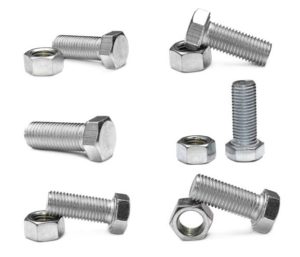
Stud Bolts is also a double-head screw that composes of external threads on both ends.
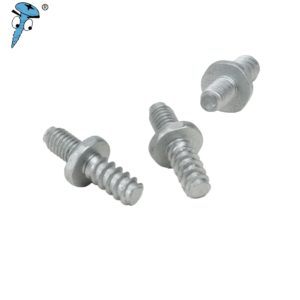
Additional Types, such as custom fastener screws and bolts, are variations of specified characters or features depending on their manufacturing.
The classic difference between bolts and screws
Bolts and screws are the two types of fasteners that are typically debated in terms of capabilities and reliability, yet they have distinct classifications that can be differentiated from each other.
Bolts | Screws |
Requires pre-matched devices like nuts and washers to function fully | Can function without mating fasteners |
More reliable in critical applications | Usually used in simple assembly like wood applications and DIY |
Diverse range of types, sizes, and shapes | have common types of fasteners in diameter |
Have a spiral thread structure | Have a helical structure of threads |
Non-tapered | Tapered |
Can be installed using wrenches and an electrical drill | Can be installed using a manual tool like a screwdriver and electrical tools or drills |
Moreover, bolts can come in different variations and quality that fit industrial and mechanical applications, while screws are widely used in DIY projects like woodworking, wood to metal, and others. Suppose you are still confused about which fastener to use. In that case, you may seek professional help from a reliable fastener manufacturer to ensure you will have accurate products for your assembly.
Read more: How are screws made?
Why are nuts needed in bolts?
It is known to many that bolts are mostly preferred for a greater extent of strength in joining materials, yet they cannot function without a mating fastener like nuts and washers.
Nuts are engineered to fit bolts’ external threads, creating a tighter joint. They also prevent the loosening of the assembly due to vibrations, force, tension, and torque. There are different types of nuts; each type proposes a shared function that secures the bolts in place and is commonly used in automotive, machinery, chemical plants, energy plants, aerospace, and more industries.
Read more: Why Should I Select the Right Combination of Nuts and Bolts?
Common uses for bolts and nuts
Construction, Infrastructures, Buildings, etc. Examples of uses of bolts are; scaffoldings in buildings that usually need a secured support structure, construction projects, roofing, bridges, railways, docks, and more.
Machinery, engine assembly, and automotive. Some of the common applications of bolt and nut assembly are engines of trucks, trains, agriculture machinery, military trucks and equipment, cars, airplanes, and others.
Power generation, chemical plants, water and waste management, and piping. Bolts designed to withstand extreme environments – involving chemicals, temperature, natural corrosive elements, etc., feature a high performance of resistance and durability.
Electronic systems and manufacturing. Fastener bolts are engineered to have corrosion resistance, including electromagnetic elements that may cause damage and failure, as well as to perform in manufacturing plants or factories.
Conclusion
Many factors contribute to the functionality of bolts and nuts assembly, but the most important aspect to remember is the correct choice of a fastener for the kind of application. The components are known to have high quality and performance with a wide range of properties that can be modified accordingly to specifications. The essential elements of fasteners are known as the size, material, shape, and finishing to improve aesthetics or increase strength and corrosion resistance.
A One-Stop Fastener Supplier and Fastener Expert
In the thriving world of today’s generation, thousands of developments are occurring in different industries and sectors that require fastening with secured components. Prince Fastener has extensive knowledge and expertise to facilitate your fastener needs. With a diverse range of standard and non-standard fastener manufacturing for over 30 years, the company ensures to meet the expectations and specifications in screws, bolts, nuts, pins, nails, washers, and other industrial commodities.





